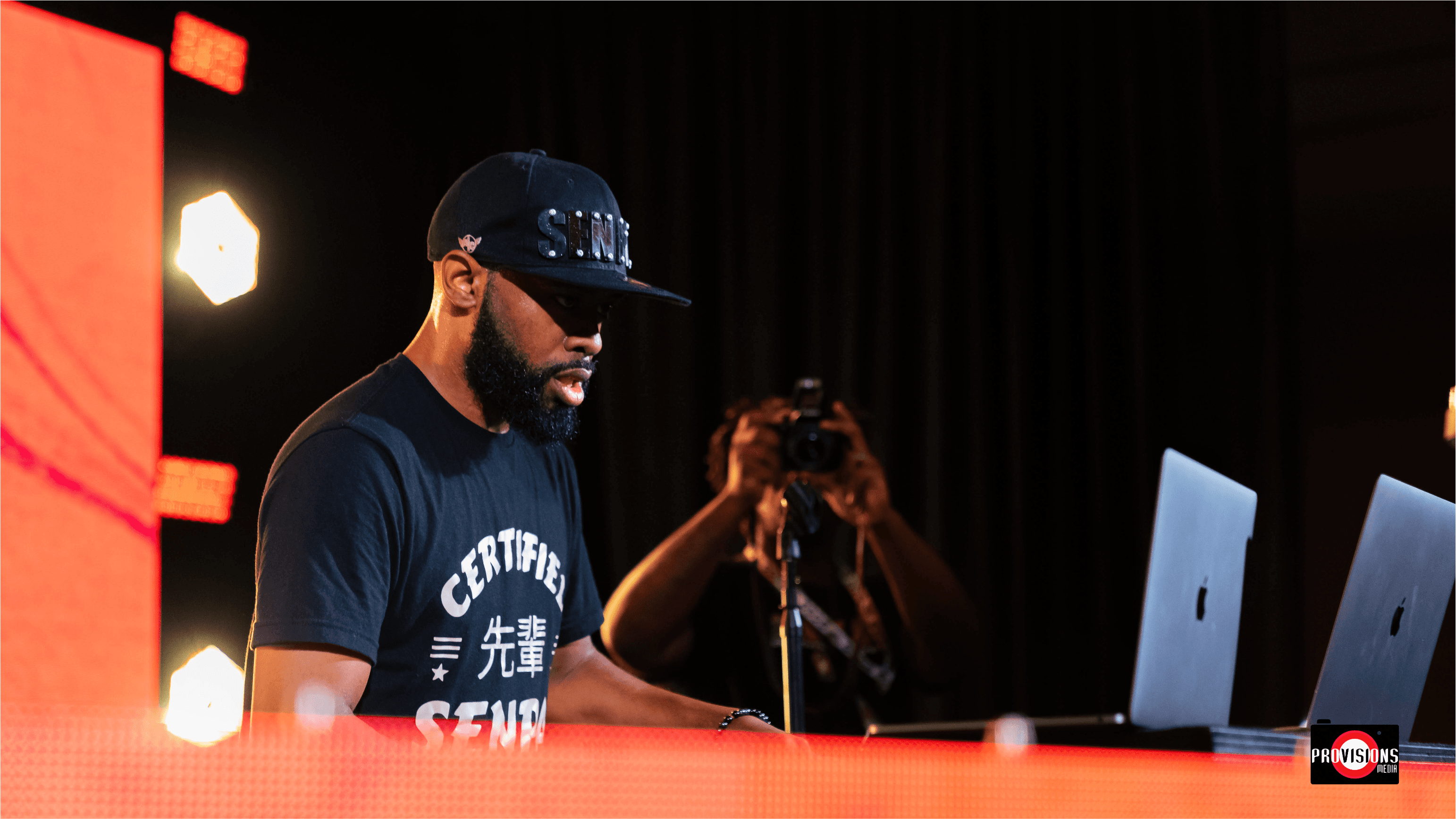SPOTLIGHTS: Talking Third World Manga and Eye X Foot with Mzati Banda and Nate
Aran Lee
May 16, 2023
During college, Mzati “Z” Banda, Third World Manga co-founder and Eye X Foot writer, discovered a passion for creating manga. His enthusiasm would spur his friend and soccer teammate Nate to join Eye X Foot as the main editor and help him find Third World Manga. Z wants Third World Manga to take a different approach towards what is usually seen in the indie manga scene. He demonstrates this with their flagship title, Eye X Foot, a story centered around Dieudonne, who is recruited to play soccer at a prestigious Japanese high school. He’s always excelled at the sport but missed one component that kept him from being great. Now at a new school with new teammates and new friends, he may finally be able to become everything he dreamed of as long as his difficult past doesn’t come back to drag him down.
Together Z and Nate have begun blazing a trail for Third World Manga by creating ten-plus chapters for Eye X Foot and developing an animated short story that serves as its prequel. OFF BLXXK learned more about their journeys as creators, the inspiration for Eye X Foot, and more during their interview on our affiliate podcast, Blxxk Anime.
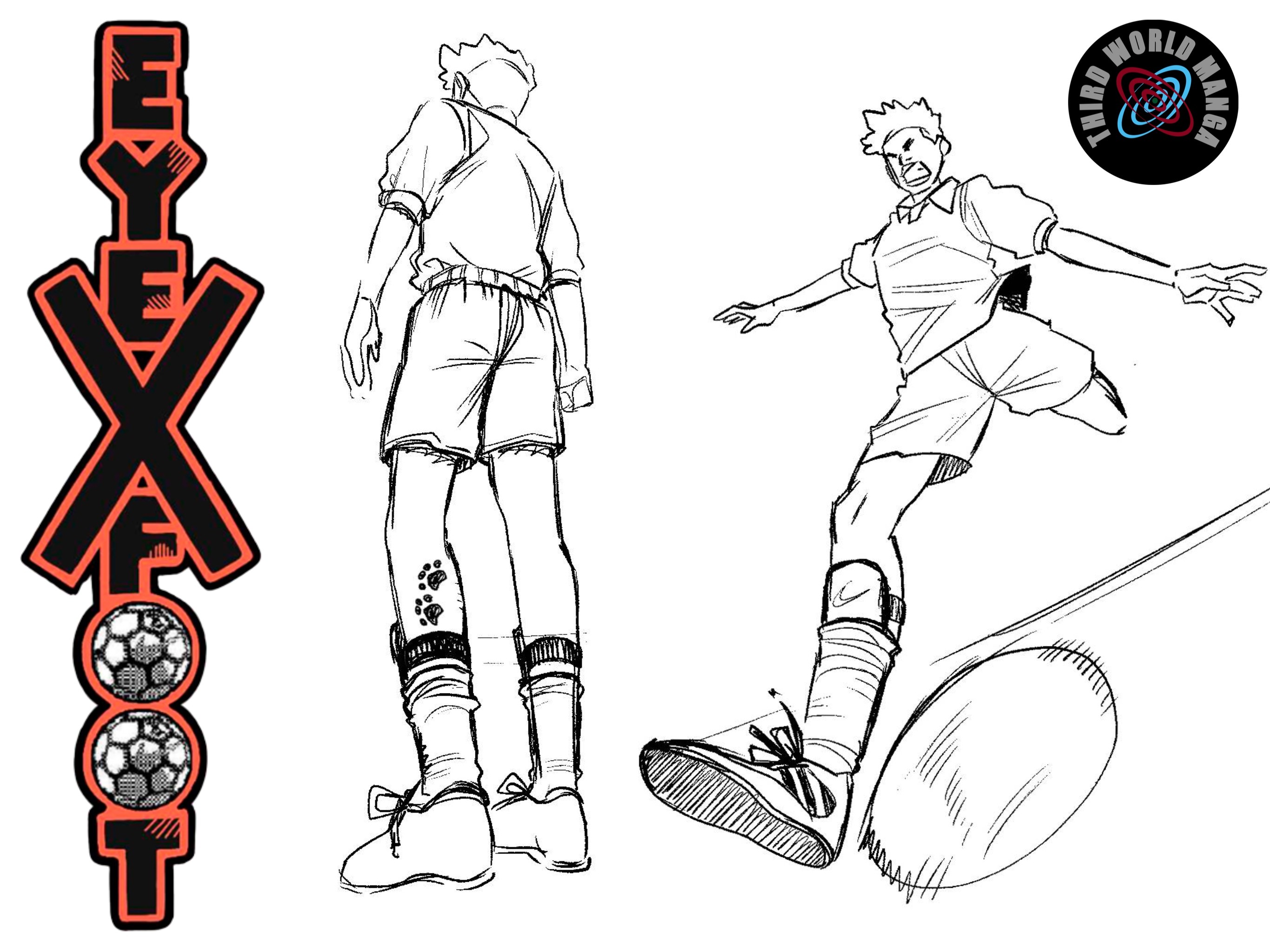
Z & Nate on Third World Manga and Eye X Foot
Let's go ahead and get into the interview and talk about Third World Manga and Eye X Foot. What is Third World Manga, to you? What is it?
Z: Third World Manga, to me, is a space in manga that's going to change the game, introduce new stories, new types of stories, and bring in fresh perspectives into manga and anime. You won't see shonen and basically map out 80% of the plots when we make a story.
Stuff's always going to be kind of fresh and unique. And Eye X Foot is an example. There's a romance in there. There's sports, there is shonen, and there's also sprinkles of slice of life. So, it's going to be really, really fresh stuff.
How and why was Third World Manga founded? What’s the story of Third World manga?
Z: I've always kind of been a business-oriented kid. Like back in Malawi, I used to sell counterfeit jerseys to my American teachers because they didn't know better. I'd make money that way, just hustling. I'd go to neighborhood shops, buy up the jerseys, and do stuff like that. So, when I started writing manga, I was like, this is cool, but I want to be in a spot where I'm making money automatically, you know what I mean? And you kind of need a name or a brand or something that people can see and go, okay, cool, that's quality. I'm going to trust it.
And that's the idea. I want something that's going to be recognizable, quality, and my own. Me and Nate, we both worked regular jobs after college. And no disrespect to a nine-to-five, it's an honest living, but damn, it sucks working under people sometimes. And there's so much money in indie comics and manga now. It’s just finding that niche where it all really works, you know?
I totally get that, especially when it comes to creative careers or trying to get into creative careers. It feels like everybody makes it seem like there are too many of them, but then every year, you see more stuff pop up. So, that leads to my next question. What makes Third World Manga and its future stories different from other publishers?
Z: Like I said, fresh perspectives. I also think because we are willing to fail. And that's why we are willing to put a fresh story out. So, we have some crazy ideas. I'll throw you one right now that hopefully we'll get to working on soon, but it's a side character who dies and ends up living in the mind of his creator. He's trying to come back to life. And he wants to come back as a main character. That's his whole goal. So, it's basically an isekai but it's not working on the same rules as the regular isekai. This is like a meta-story. He’s existing in the author's mind and he's trying to prove himself as a character.
So, it's something like that. It's cool, it's crazy, and it's not typecast. Like you said, even the indie stuff that comes out just… That's a re-skinned Dragon Ball Z or a re-skinned Naruto, which is like all power to people, but people know it's not going to fail, so that's why they keep releasing it. But we're not allowed to fail. And just [have] fresh perspectives. I'm from Malawi, so I've lived a different life than most people here and have experienced different things. I love throwing those things into my stories in different ways and in little ways, whether that be the name of a villain or something or what. And Nate's from Indiana, so not terribly different than most Americans.
But yeah, we're just not afraid to fail, and we are willing to keep taking risks. Like this short film: Honestly, I have no animation background or anything of that sort. But I just want to do it because I think people will like it when it comes out, it looks good, and why not? And I guess Third World Manga is special because why not? We always ask that, and then we just keep going. I hope that answers the question.
It does thoroughly answer the question. I think bringing your own first-hand experience into your work is the most important thing. You should always just be yourself. You know, it's like a simple thing that people say, but it's the truth. Do you have any specific personal experience that has influenced Eye X Foot or future manga you want to do?
Z: With Eye X Foot? If you read Dieudonne's story, you're basically reading my life. Junior year of high school, essentially. So what happens to him at the point you meet him—he's kind of like homeless, so to speak. I wasn't homeless, but you know, he's in a thing with his mom, who's kicked him out. And certain things that; that did happen to me.
So, Dieudonne is essentially me, in a lot of ways. So that experience is there. In other stories, most of my characters, a lot of the characters in Eye X Foot, are inserts from my real life. I would tell you who, but if they ever want to sue because of their descriptions, I'm not about to give them room.
But, the character, Gi: I had a Korean teammate; he’s very good at soccer. I put him in there and basically exaggerated. He's just an example of one. He’s aware that it's based on him. And a lot of the characters in Eye X Foot are based on people I've met in real life. In coming chapters, there's a character based on Nate—a caricatured up version of him.
I think it's the easiest way to write. Just take what's around you and put it in the story. It's the stuff you know. I always make it a rule to never write about things I don't know. That's how you get bad writing.
That leads to my next question: When people read a work from Third World Manga, what should they expect? You talked about authenticity and your personal experience; is there anything else they should really feel or get from it?
Z: I think they should expect to see things they've never encountered, but like flipped or made to feel larger than life. That's evident through Eye X Foot. I think indoor soccer might be something everybody's experienced, but I want to give it the [feeling] that this is grandiose and huge, even if you're not into it. If you are, then you get to see certain things in a cool light. Same with the story about the side character I just told you about. We've all seen side characters. Now, let's see them in a different perspective. Let's see them trying to be the main character.
So this idea of taking something that's simple and always in your world somewhere and making it something greater is one of the things they should expect. They should expect a fun, enjoyable story. I think that's probably a bit of a prerequisite, but I want these stories to just be enjoyable and easy to read, and I want people to want to share them.
They should expect something that they're going to be infectious over. Like, “Okay, I read this and I really want to show someone else this story.” They should expect diverse characters and not just for diversity's sake. The world has diversity; the stories are going to have diversity. They'll expect diverse characters just because the world is diverse; why shouldn't stories?
Nate: Just based off of how we've worked through almost every single page at some points, trying to get Eye X Foot out in many different iterations… I think the quality of the storytelling is something that people can look forward to, and it's going to be fresh.
In my opinion, in a lot of the stories that we encounter on a yearly basis now, the storytelling is second to the visuals sometimes to have mass-marketing appeal, and the cheap kind of gimmicks versus the story being foundational. I think that's one thing that people can expect. It’s going to be like drinking, I don't know, any number of refreshing drinks you can think of.
Z: Yeah. Me and Nate, we listen to MF Doom. And I love MF Doom, and there's that one quote where they ask him, why do you wear the mask? And he is like, “I want it to be about the music.” [With] entertainment nowadays, you have to be an influencer first. And then once you're an influencer, you're like, "Hey, buy my t-shirts, buy my manga, buy my something." And me and Nate are not influencers. We're not very good at marketing, low-key. We’re going to get better.
But we want the story to speak for itself because we're not influencers. We're not expecting you to get the story just because you like us. It’d be fine if you like us, but we've always focused on story first. And then, of course, if you like us, you like us, but we want the stories to really stand alone and be their own thing. That's kind of what's cool about anime and manga. A lot of manga comes out and you don't know the mangaka until years later. I didn't know who Toriyama was, and I grew up watching Dragon Ball cause Dragon Ball spoke for him.
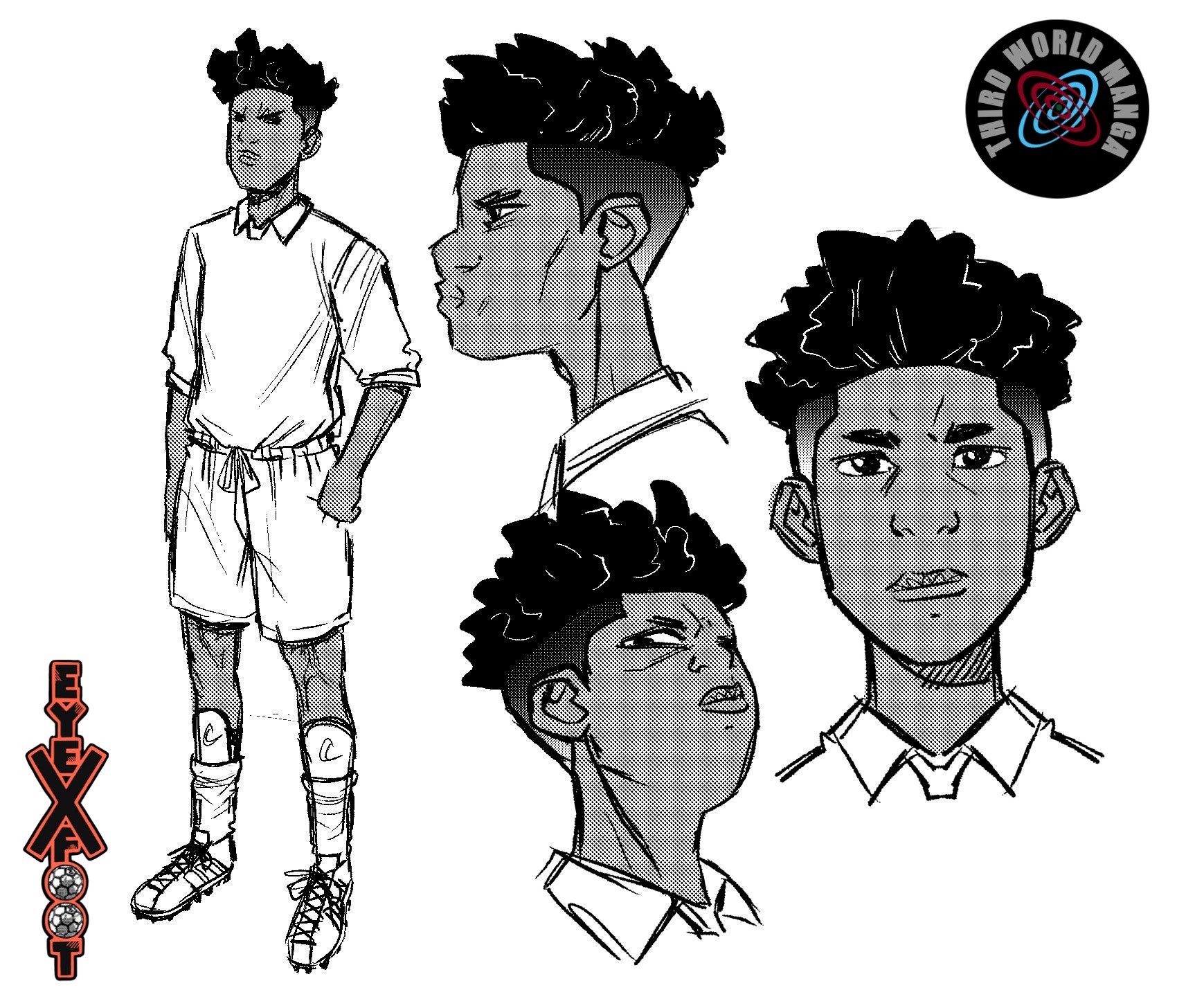
That's facts, man. That personal connection is a lot. How did you two come together for Third World Manga? What was the linchpin?
Nate: Oh, that's a great question. Honestly, the conversation I think that we're having now is a conversation that I had with Z fairly early on. Some of the things that I really miss about college is not the parties necessarily (because Lord knows those weren't happening at HU). But when you're in the dorm at 3 o'clock at night, and you've literally got nothing else to talk about, you just put on some video games, some MF Doom, or some really good music, and you just chat. Through our conversations, I loved getting to hear Z talk about something that he's actually passionate about besides soccer (Which, we also go back and forth on that a lot too).
I just loved hearing that. Writing manga, especially writing in general, is not looked upon very positively here in the States. I don't think it's one of those things; it's not expected to make you a lot of money. So, therefore, it's not really that admirable. On top of that, manga especially is like, “Bro, are you asking to be poor?”
Just hearing [Z] talk about that with such, I don't know, vigor. It was very inspiring to me. In high school, I took creative writing classes, and I [thought], “Writing would be fun, but of course, it doesn't make you money, so I'm not going do it.”
And then we just kind of started reading each other's stuff. I read his stuff mainly at first until I started writing. Fun fact: I have written a book and it's not very good, so I'm not going to talk much about it. But just through that process, I was like, “Wow, this is a lot.”
And a lot of people who don't understand the process don't understand how much actually goes into it. Once we started talking, I was like, “Dude, this is so cool. How can I help you do this?” At that point, we had already become pretty close friends, especially on the soccer team and playing Gears of War until 3 o'clock at night when we should have been studying for exams.
That was fucking awesome. After that, we were like, “Dude, let's just do this.” And then we just started doing it all the time. Then it just felt natural. That's why it's weird to talk about who's the owner.
It's weird how it naturally has become like we are the same thing at this point. Obviously, it's Z's thing and it's his, but we've just been working on it together for so long now it's almost hard to even determine when the actual start was. We just feed off each other so well. There is no Eye X Foot without the two of us together, if that makes sense.
That makes a lot of sense. That's awesome. Moving through the questions, talking about y'alls journey through Third World Manga and everything, what are your goals? If y'all had a five, 10, or 15-year plan, what would be the landmarks you'd have to meet?
Z: Five, 10-year plan. Definitely, outright, an anime. I don't think we're ever too coy about it. I think we want one of our creations to end up on TV somewhere. Not saying we deserve it or something, but I think the stories are good enough to get to TV.
And just to be in stores. Like you said, you go to Barnes & Noble and you get manga. It sounds like you're kind of like me where you read them, but they're also cool decorations to just stack up over time. And we want people to go to Barnes & Noble and find our stuff. There, or go to Walmart (shout out Saturday AM; they're getting a lot of their stuff in Walmarts across the country). We kind of want that type of feeling. You go to a store, you can see our stories, you can recognize the characters.
I went to the Wicked Comic Con this weekend. I cosplayed as Dieudonne and showed people the manga and they were amazed. The first thought in my head was like, in five, 10 years, kids are going to be dressed as Dieudonne coming up to me. And I'm going to be sitting there looking like the tired creator at the con who has to perk up for this fan who's just shown up. And they're going to be wearing the lamb mask and everything and looking at me. They're going to be looking at all the other stories we've written—Side Chronicles or something else. And they're going to be like, “Yeah man, I've started here and this is what this character means to me.”
We want to make stories that mean something to people. And in 10 years, we want those stories to be available in places where they can find them. Essentially, in 10 years, we don't want to do any more marketing because the stories will be so widespread that people will just find us.
I think that'd be awesome. Y'all should definitely sell some physicals; that'd be awesome. But before we get into more specific questions, I wanted to ask real quick if you both could pick three anime/manga that were an inspiration to you, what would they be?
Z: I'll go first. An inspiration anime… I'm going [with] Mob Psycho 100. I always loved it, always loved that even the manga is story first because the art is what it is. The art works for the story, obviously, but you're not going to beat out something that's like crazy or testing.
Let's see, what else? Oh, Dragon Ball Z. As much as I am not a big fan now, that's the OG. That’s what I started on. And I remember, as a kid, I would draw my own Dragon Ball Z comics. Before I even knew that Dragon Ball Z started out as a manga, I would draw little comics and stuff.
So I have to put it in there for that. That's the inspiration of inspirations. And then last one: I think Run with the Wind, the sports anime.
That's a good one.
Z: You know, game, recognize game. That is, maybe, the sports anime GOAT. The only reason it doesn't have that distinction is longevity, right? Haikyu has way more episodes. Blue Lock is about to have more episodes. Run with the Wind was 24 episodes and achieved more than both those anime combined, I think. So that's me, what about you Nate?
Nate: Oh, this is hard since I'm not actually writing it. I would say in terms of when I'm editing it, I'm thinking of plot, cohesion, and is what I'm reading actually having an impact on me as a reader? Where I'm addicted to it, I just want to keep reading it.
I love a good villain. And I think that even though I haven't finished Kuroko No Basket, I think the sort of “villains,” if you will, the special characters with these crazy special powers… That's just something that has always stuck out to me. Again, I haven't finished the anime, so a little asterisk there. But that one has always stood out to me.
Run With The Wind also, just because that's one of the few anime, especially one of the few sports anime, that has brought tears to my eyes. It's just such a beautiful anime. So that one as well.
And then—honestly, this is going to sound super nerdy, but I'm such a nerd. I love taking everything from every different possible angle and then trying to combine it together. I just bring in things from outside of anime, like writing in general. For a lot of logical things, I try and think about it from a mathematical perspective. That just sounds so whack. But there are so many interesting philosophers and so many interesting ways to think. I do a lot of coding, so that kind of influences me, at least from an editing perspective. I'm like, “Does this make sense at all? If you put two and two together, does that equal four? It equals five. Well, then no. So we got to rework this somehow. You know what I mean? So, I think those are probably the big two that have really inspired me, at least when I'm editing.
And then the third one isn't even—sorry that didn't really answer the question—but a third one is not an anime at all.
It still answers the question. I totally get that. I mean, I do a lot of coding, so I totally get that. Going into talking about Eye X Foot—actually no, that's the first question. Do you pronounce the “X?” This is the biggest question in anime history. Do you pronounce the “X?”
Z: If you want to. Do you want to pronounce the “X?” “Eye Foot” sounds dope; “Eye X Foot” sounds dope. “Hunter Hunter” sounds dope; “Hunter X Hunter” sounds dope.
So, how would you describe Eye x Foot? What is your description of it?
Z: Eye x Foot is She's the Man meets Kuroko No Basket with a splash of Kaguya Sama Love Is War.
A lot of genres.
Z: Lot of genres. Eye x Foot balances them all. It's a high-intense futsal action with a great story that's character-driven, so nothing's just randomly happening. And there's a romance in there as well.
Everything’s happening and everything relates back to futsal somehow, someway: The romance does, the characters do. So the game becomes a way for viewers and for [the characters] to change and for us to see how they change and tackle certain aspects of life and certain things. So, it's seeing characters through a sport, almost—not seeing a sport through characters, which some sports manga make the mistake of doing.
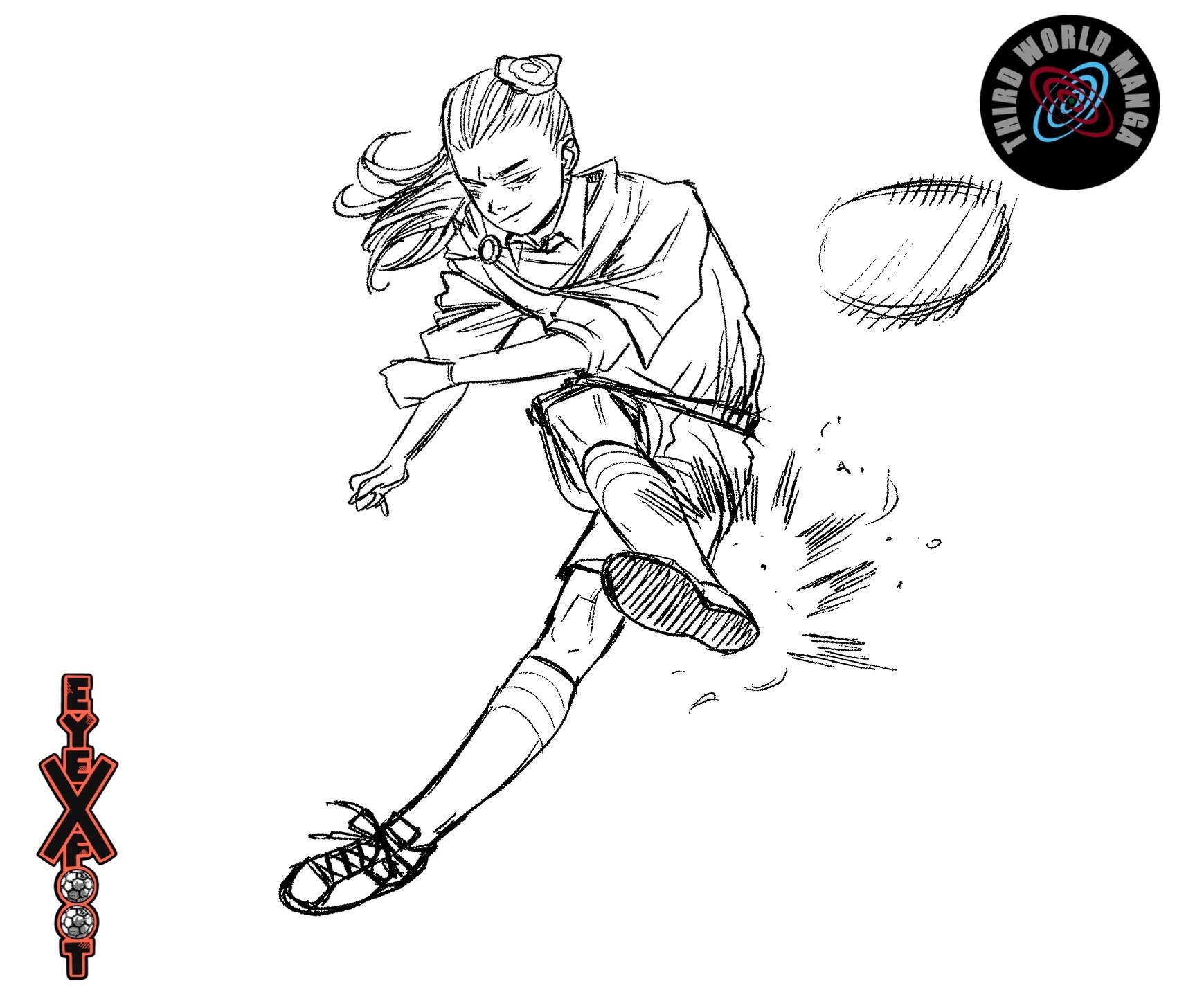
That's fair. Talking about that. You know, as a former athlete myself, I know how important my past as an athlete means to me. You talk about relating everything back to futsal; that’s what the main character does in Eye x Foot. I feel that I relate a lot of my life back to football because, without football, I wouldn't be who I am today. So, my question is, what does soccer mean to you, and how do you take that meaning and apply it to the world of Eye x Foot?
Z: I think Nate will probably agree with this: Doing this on top of other work and life feels like being a college athlete all over again in so many ways.
Right now, there's not a real big compensation as far as money’s concerned. There’ll be days, especially now that I've been animating, where I'm going to sleep at like 2, 3 a.m., and having to wake up at 7. It feels like, if it wasn't for soccer kind of ingraining [doing] the extra work, [being] consistent—those types of values and [executing right] because sports doesn't let you get away without executing. There are scoreboards, you know what I mean? It doesn't matter how well you played, if you lose the game or anything. It won't matter how many hours we stay up—if people read Eye X Foot and they go, “Ah, this is garbage.” That's something that I learned from soccer.
Me and Nate would get up, especially our freshman year, when we thought the team was a meritocracy. We get up and practice.
Nate: Yeah, and it's interesting, with sports, especially soccer. When I think about it, I just… The best teams understand, whether they know it or not, game theory so well. I'm not just saying that to throw out some smart-sounding things. It is crazy you can do so much more as a team than you can individually. And we saw that with Argentina during the World Cup—all the teams supporting Messi.
And while he was still pretty spectacular as an individual, he would not be anything without that team supporting him. And Argentina was by far the most cohesive team as a team—at least in that tournament—and they won. I think you can also see that in Eye x Foot. The whole one big theme of Eye X Foot is this sort of individualism versus team cohesion, and how do you balance the two?
That is so integral to being on a sports team, and I think you can see that throughout Eye x Foot, and it's really cool because that affects your life too, in general. But yeah, that's one of my main takeaways from soccer.
I definitely feel all that—when it comes to football too. It's interesting how athletes—once you get out of the sport, your mindset doesn't change. You take everything you've learned and grew from with that into whatever you do next. And you can see it in the manga a lot. Talking about Eye X Foot and soccer: What was your inspiration for Dieudonne?
Z: Fun fact: Dieudonne is my middle name. It means “God-given” in French. Inspiration? Definitely me. He’s smart with his mouth. He's a little bit unruly. But in a lot of ways…early Naruto, where you still, despite all of his flaws, you still kind of want to love him, you know what I mean? Early Naruto was always complaining and trying to be cheeky or something, and honestly, kind of an annoying person, but at the end of an episode, you'd be like, “Dang, I love him.”
And so Dieudonne is like me and Naruto had a baby that doesn't have hella chakra or plot armor. He's left-footed, just like I am. He loves playing indoor soccer, and he's got a confidence hang up on the court, which, you know, not saying I had all the time, but on days when I was like, “Damn, I could use a little more confidence.”
But yeah, me and Naruto were the biggest inspirations. Of course, I tried to not make it too shonen, so I don't dive too much into the Narutoness. I just want to make him as lovable as Naruto is because I think you can say anything about Naruto, but he is one of the most lovable anime characters.
It was not for me, but I totally get that. Next thing I have to ask about is the mask. What does that symbolize? I see it sometimes in the manga; you see it kind of used as these inner thoughts or, I guess, inner self. I don't know how to explain it. It speaks to Dieudonne in a way, like a different part of him. So, what does that mean, and what does that mean to him as a character?
Z: Like you said, when [Makoto’s] mask would speak to [Dieudonne] and be like, "Yo, you can't pass the ball…” When they used to play together, they would get to the final, and they would always lose to this one team. So, that team used to call them sacrificial lambs.
Him and his old teammate [and now rival Makoto], who now basically haunts him, were wrestling fans. There's a wrestler named Bray Wyatt who used to wear a sheep mask, or one of his underlings used to wear it. So in Eye x Foot, [Dieudonne and Makoto] were like, “Yo, they called us sacrificial lambs—we're going to own it. We’re going to wear the mask and become the thing they say we are, and we're going to beat them while being this thing.” That's why they started wearing the mask.
Now [Dieudonne] wears the mask because he wants to beat his old teammate and get him back. That’s going to be detailed more in the short film; the whole origin story and how it all came to be will be explained there in way more detail and in some cool animations. But, that is the story behind the mask.
It’s funny because when I first put on the mask—and I'm glad Nate did just shoot it down because it didn't make too much sense—it didn't actually have a story at all. Then, as I wrote it, I was like, okay, the mask definitely needs a story because someone's going to ask.
My last question for this interview is: How do you think your sports manga stands up to other popular sports manga?
Z: That is a good question. Not to be arrogant, but I think it's better than a lot of other sports manga. Personally—it's kind of like the sports mentality, right? I think of sports manga as [being] about sports or any competitive [event]. Like you said, you take that athlete mindset with you. There were days when you were playing a team that was better than you, but you still had to look at yourself in the mirror and be like, “I'm going to be better than these guys on the field, on the track, or whatever.”
It's the same with the manga here. I think it's better than a lot of other manga. I think the story's more intriguing. I think it's fresh. I think the characters have more variety to them. I think the art—you know, I'll say some of them have better art.
But I think Eye x Foot, when compared to other sports manga…it's up there. It's just not known yet. I think the story and everything is better than most because a lot of sports manga have a lot of random stuff happening. There’s always a trend of the nerd who gets to go up from the bottom and become a real star, or there are always two prodigies; Haikyu does that. Eye x Foot doesn't do any of that and still manages to be a fun story that's enjoyable to follow with nice art as well. So, long story short, yeah, I think it's better than most.
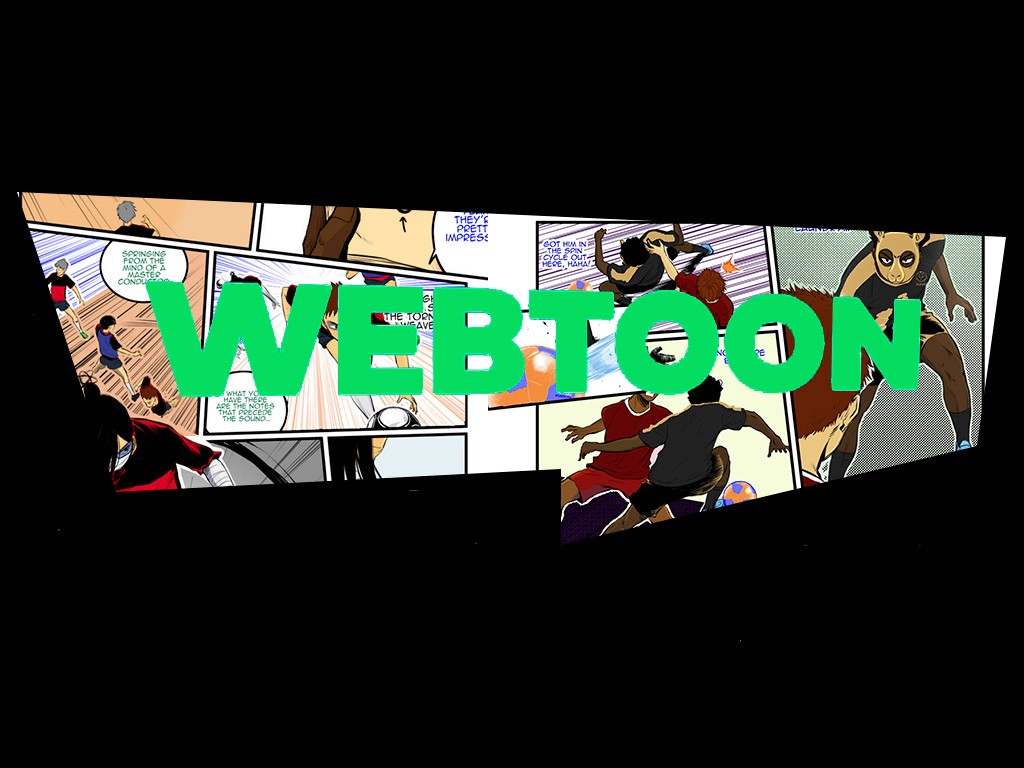
Big words. That's all I had for the interview. I can't wait to see what comes next for you guys.
Z: Thank you. Big things are coming—like BIG things are coming. Trust me.
Nate: Thanks for having us on here.
To hear the full interview with more questions and candid discussions, head over to Blxxk Anime. If you are interested in reading Eye X Foot, you can find all the chapters on Webtoons. You can follow Third World Manga on Twitter and Instagram.


